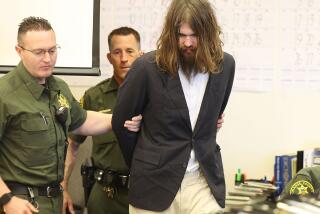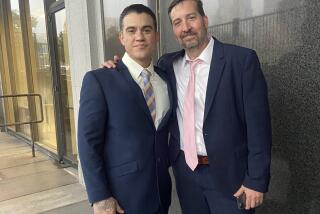George Whitmore Jr. dies at 68; exonerated in three N.Y. murders
In the city of New York, in 1964, a destitute young black man named George Whitmore Jr. confessed to three murders he did not commit.
“I didn’t do it, but they wouldn’t believe me,” Whitmore, then a 50-year-old handyman, told New York Newsday in 1995. “At one point I really did think I was going to the electric chair.”
He was eventually proved innocent, and his legal case helped persuade New York lawmakers in the mid-1960s to drop the state’s death penalty for most crimes. The case was also cited in the U.S. Supreme Court’s landmark 1966 Miranda ruling, which established such protections for suspects as the right to remain silent.
Whitmore died Oct. 8 at 68 in a Wildwood, N.J., nursing home. The cause was a heart attack, a daughter, Regina Whitmore, told the New York Times.
He was 19 when he was taken to a Brooklyn police station for questioning about an attempted rape.
By the time his interrogation ended several days later, he had confessed to the attempted rape, to the recent murder of a woman in Brooklyn and to the high-profile murders of two young women in 1963 in Manhattan.
The nearly blind Whitmore later recanted the confessions and maintained his innocence, saying police had beaten him and made him sign a confession without knowing what it was.
“Call it what you want — brainwashing, hypnosis, fright,” one unnamed prosecutor told the media, according to a 1966 Los Angeles Times article. “They made him give an untrue confession.”
Although lawyers and reporters were able to expose Whitmore’s confession as a fabrication, he was in and out of prison because of the various cases until 1973, when prosecutors said new evidence exonerated him of the attempted rape.
Upon his release for good — almost exactly nine years after his original arrest — he said, “No animosity. I have no animosity,” Newsday reported in 1995.
The son of an itinerant laborer, Whitmore was born May 26, 1944, in Philadelphia and grew up in Wildwood, N.J., in a poor family.
He sold his false-confession story to Hollywood for “a few thousand dollars,” according to Newsday. It became the basis of the 1973 television movie “The Marcus-Nelson Murders,” which spawned the “Kojak” television series.
After winning a civil lawsuit for wrongful imprisonment, Whitmore bought a small dairy farm in New Jersey but failed to hold on to it.
While living in Wildwood, he operated a commercial fishing boat for a time. Disabled in a boating accident, he struggled with unemployment.
Whitmore, who never married, is survived by four daughters, two sons and more than 20 grandchildren.
More to Read
Start your day right
Sign up for Essential California for news, features and recommendations from the L.A. Times and beyond in your inbox six days a week.
You may occasionally receive promotional content from the Los Angeles Times.






